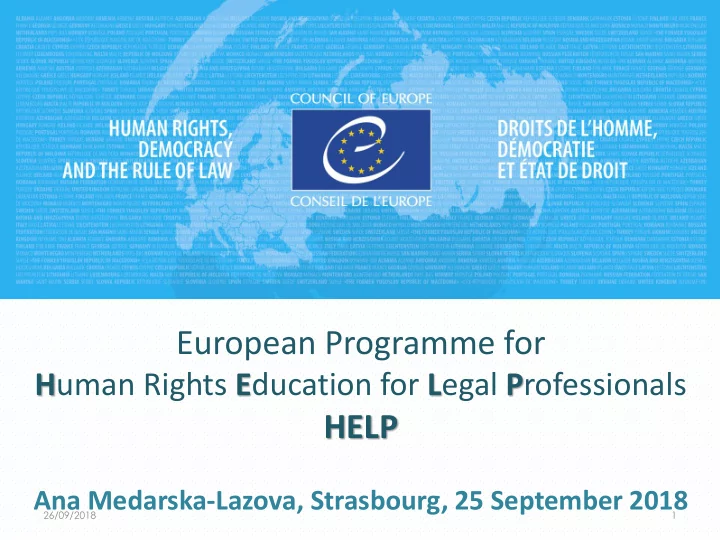

European Programme for H uman Rights E ducation for L egal P rofessionals HELP Ana Medarska-Lazova, Strasbourg, 25 September 2018 26/09/2018 1
Overview What is HELP? HELP three components Geographical outreach 2
HELP ’s goal HELP judges, prosecutors and lawyers to apply European human rights standards in their daily work, mainly by training
fhfghdfhdgh fghfhdfghdfg hfgh HELP is: • the only pan-European Network of national training institutions for judges, prosecutors and lawyers in the 47 Member States; • online courses on human rights; • a human rights training methodology for legal professionals.
Enlarged European Human Rights Training Network - National Training Institutions ( Focal Points ) - Bar Associations ( Info Points ) - HELP Annual Network Conference - Training needs assessment – Roadmap for the next year
Free e-learning platform and courses
+26.600 ENROLLED IN THE HELP ONLINE PLATFORM Out of which 6.320 TRAINED BY HELP TUTORS
HELP Online courses! Main features 1) Developed by experts in the area; 2) Interactive and visual; 3) Adapted to the target audience: • Their needs and • Their time (layered learning). Two types of HELP courses for legal professionals: 1) HELP Online courses (self-learning) and 2) HELP tutored courses. 10
HELP Online courses: Free Available to anyone who makes an account on HELP’s e -learning platform Learning when and as much as the users have the time Statement of accomplishment 11
Tutored Courses – leading to certification - Available only to legal professionals participating in HELP-tutored courses - Certificate (CoE + NTI/BA or other national institution) - Advantages: facilitated by trained and certified tutors and possibility for discussion and exchange of opinions - + NATIONAL ADAPTATION! 12
Catalogue of HELP Courses 19. International Cooperation in Criminal 1. Admissibility criteria in applications Matters submitted to the ECtHR 20. Internally Displaced Persons 2. Alternative measures to detention 21. Labour Rights as Human Rights 3. Anti-discrimination 22. Pre-trial Investigation in light of the ECHR 4. Asylum and the ECHR 23. Prohibition of Ill-treatment 5. Key human rights principles in biomedicine (May 2018) 24. Procedural safeguards in criminal 6. Business and Human Rights proceedings and victims’ rights (2018) 7. Child-friendly Justice 25. Property Rights 8. Combatting Trafficking in Human Beings 26. Refugee and Migrant Children (June 2018) 9. Counterfeiting of Medical Products 27. Reasoning of (Criminal) Judgments 10. CPT Standards (2018) 28. Rights of Persons with Disabilities (2018) 11. Data Protection and Privacy Rights 29. Right to Liberty and Security (Article 5) 12. Drugs (2018) 30. Right to Respect for Private and Family Life 13. Family Law (interactive version 2018) (Article 8) 14. Fight against Racism, Xenophobia, 31. Right to the Integrity of the Person Transphobia (Bioethics) 15. Freedom of Expression 16. Hate crime and Hate speech 32. Transitional Justice 17. Human Rights in Sports (2018) 33. Violence Against Women 18. Introduction to the ECHR and ECtHR 34. Women’s Access to Justice (2018)
HELP pipeline courses for 2018 • Child refugee and migrants • Procedural rights in criminal proceedings and victims’ rights EU funding • Radicalisation Prevention • Family Law • Rights of persons with disabilities • Human Rights in Sports • Fight against Drugs • Women’s Access to Justice
3) HELP Methodology HELP Training of Trainers sessions are organized to ensure the implementation of the HELP Methodology (please click on the Guidebook cover page to access the Guidebook) HELP Methodology: - HELP course development - HELP course adaptation and implementation - Principles of adult education
HELP training methodology – Timeline Activity Period (Months) Training Needs Assessment (TNA) – identification of priority topics Selection of experts/consultants I WG meeting 1-2 Curriculum development of model course II WG meeting 3-4 (English) III WG meeting 5 Development of articulate version (English) Storyboard meeting 6 Translation into national language 7-8 Adaptation to national legal order 8-9 (by HELP trainer) Selection of participants 9 Implementation of the course and Launch (face-to-face event) 10 validation at national level Implementation 10-14 Certification/Evaluation 15
CoE HELP’s geographical outreach – 830 million Europeans
HELP strategy • Objective: better protection of human rights • Current projects with external funding: • HELP in the EU • HELP in Western Balkans • HELP in Russia • HELP Radicalisation Prevention • HELP component in CoE Action Plan on migration (focus on children) • HELP activities in Belarus • Expanding coverage in CoE MS and beyond (i.e.Belarus, Mediterranean) • Increased cooperation with Universities
HELP in the EU (CoE, CGPJ, CGAE, NIM) ➢ New HELP courses /modules: family law procedural rights in criminal proceedings and victims’ rights gathering and use of evidence in terrorism cases ➢ New 15 national adaptations for EU MS ➢ 8 Cross-border courses piloted covering 20 (new & existing) courses ➢ Training of Trainers (ToT) ➢ Target: 560 EU legal professionals 20 EU trained trainers
HELP Radicalisation Prevention ➢ New HELP course and 4 nat’l adaptations Basic module(s) (for all) for consistency and cross-profession Specific modules for ✓ Prisons and probation staff ✓ prosecutors and judges (prison oversight ones) ➢ 2 Cross-border courses for 3 EU MS each (for 180) ➢ 3 European Seminars (for 180): ➢ exchanges on risk assessment tools ➢ implementation of de-radicalisation actions ➢ best practices - counselling and dev’t of counter narratives ➢ ToT for 12
Join us: Web, Facebook & Twitter #HELP coe.int/help facebook.com/CoEHELP/ twitter.com/CoEHELP
HELP Good training for good judgments Thank you very much for your attention! Ana.MEDARSKA-LAZOVA@coe.int Head of HELP Unit: Eva.PASTRANA@coe.int HELP in the EU: Ana-Maria.TELBIS@coe.int 23
Recommend
More recommend